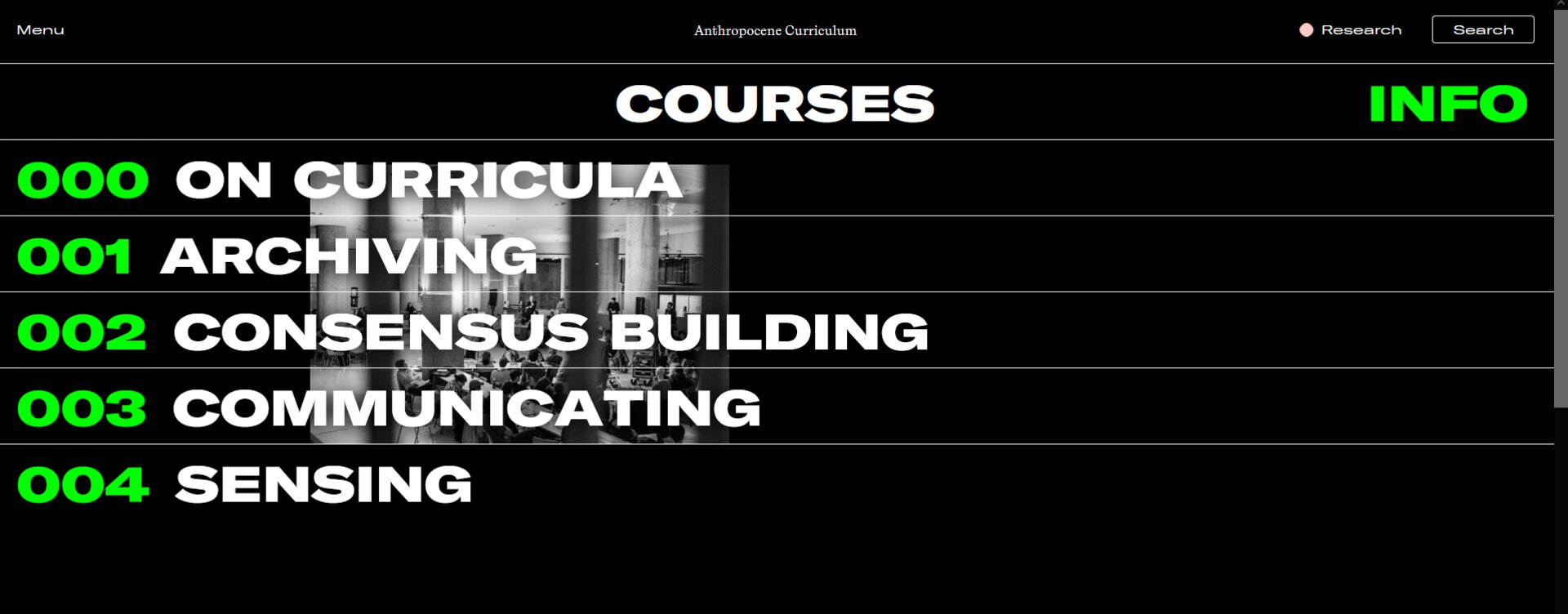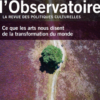This text is licensed under the Creative Commons license Attribution-NonCommercial-ShareAlike 4.0 International. The link to the original material is situated at the top right of the text.

Screenshot of the website, taken on 30.04.2022
Project
Keywords: anthropocene, international project, experimental co-learning, knowledge production, knowledge sharing
Threads: (Un)framing Knowledge, Cooperating with(in) arts and culture, Learning, Inquiring
Anthropocene Curriculum
Haus der Kulturen der Welt, List of Contributors
2013
Keywords: anthropocene, international project, experimental co-learning, knowledge production, knowledge sharing
Threads: (Un)framing Knowledge, Cooperating with(in) arts and culture, Learning, Inquiring
Short description
The Anthropocene Curriculum is a long-term initiative that explores frameworks for critical knowledge and education in our ongoing transition into a new, human dominated geological epoch—the Anthropocene. The project draws together heterogeneous knowledge practices, inviting academics, artists, and activists from around the world to co-develop curricular experiments that collectively respond to this crisis of the customary. It does this by producing experimental co-learning situations and research possibilities for transdisciplinary collaboration that are capable of explicitly tackling the epistemic and geo-social dimensions of knowledge that are at stake in this new epoch.
What should a body of “earthbound” knowledge contain that traverses from the global to the local and back? What forms of knowledge transmission are appropriate and lasting in these trans-scalar conditions and mutual interdependencies? Taking into account issues of access and agency, asymmetrical justice, traditional knowledge forms, and ways of inhabiting the Earth, the project accounts for the varied means of experience and seeks to find a common ground for future scholarship and practice
What should a body of “earthbound” knowledge contain that traverses from the global to the local and back? What forms of knowledge transmission are appropriate and lasting in these trans-scalar conditions and mutual interdependencies? Taking into account issues of access and agency, asymmetrical justice, traditional knowledge forms, and ways of inhabiting the Earth, the project accounts for the varied means of experience and seeks to find a common ground for future scholarship and practice
Personal appreciation
I found the information on the Newsletter of the HKW which often contains interesting information or inspirations regarding to the SHAKIN project. This project is a place of many resources and connects artistic, ecological and reflexive practices. Even though it is not subaltern in itself (funded by big institutions in the West and speaking to a very privileged group of practitioners through its design and display of content), the way the contributors present and explain their practices can be interesting for professionals who want to engage in reflection around contemporary crisis. Some project include working with subaltern knowledge, especially regarding human-nature relationships.
Contribution to the "Who knows?" handbook
The project provides curricula, projects and events that address questions related to knowledge production and transmission in the Anthropocene. In the curricula the information is structured in pathway that facilitate the accessibility of diverse resources:
Courses on 4 big topics are proposed as a text with different linked contents, which can be projects/initiatives, essays, texts, sound, video by researchers, artists and activists:
Archiving, consensus building, communicating and sensing. Reflection on knowledge production and transmission, as well as structures of domination are fundamental to the displayed material. There are a lot of resources that resonate with the topics and questions of the SHAKIN project.
Courses on 4 big topics are proposed as a text with different linked contents, which can be projects/initiatives, essays, texts, sound, video by researchers, artists and activists:
Archiving, consensus building, communicating and sensing. Reflection on knowledge production and transmission, as well as structures of domination are fundamental to the displayed material. There are a lot of resources that resonate with the topics and questions of the SHAKIN project.
Material(s)
Additional Information
| Location | Online + weeklong educational events Germany |
| Original language(s) | English |
| Existing translations | |
| Length | |
| Project runtime | 2013 - |
| Institution of affiliation | Haus der Kulturen der Welt Max Planck Institute for the History of Science |
| Sponsor(s) |
Name of contributor: Sonia Nikitin
Additional Pictures
Creative Commons
Related Contributions

Magazine
Ce que les arts nous disent de la transformation du monde (What the arts say about world transformations), Revue L’observatoire n°57, la revue des politiques culturelles
Jean-Pierre Saez, Maud Le Floc’h, Camille de Toledo, Bruno Latour, Estelle Zhong Mengual, Marielle Macé, Jean-Philippe Ibos, Lauranne Germond, Thierry Boutonnier, Thierry Dutoit, Olga Kisseleva, Benoit Peeters et François Schuitten
2021
This magazine gives the floor to artists and philosophers focused on climate change and biodiversity in relation to art. They tell us how the world is changing, the main issues and their vision on a new world they are expecting.







